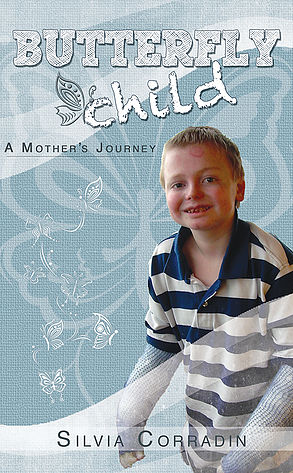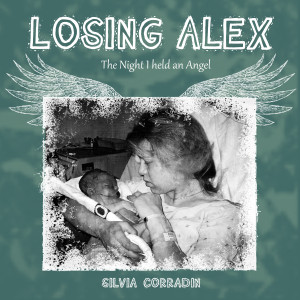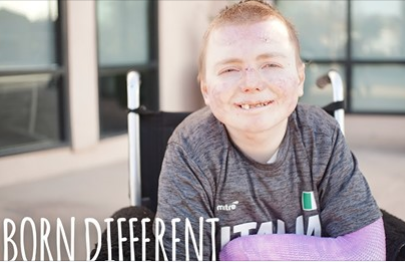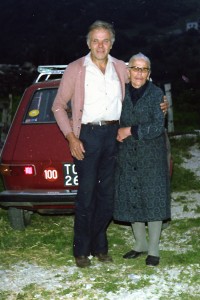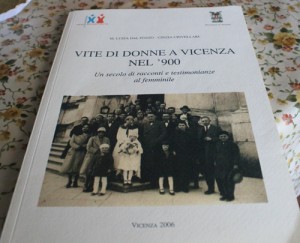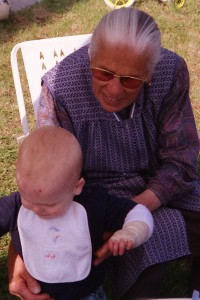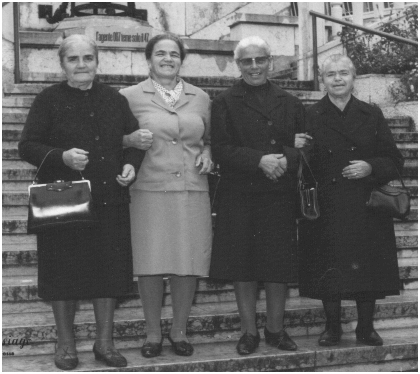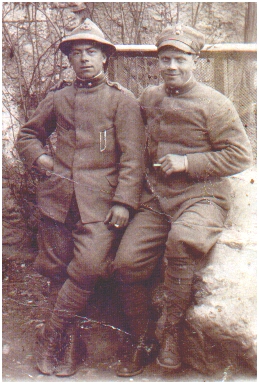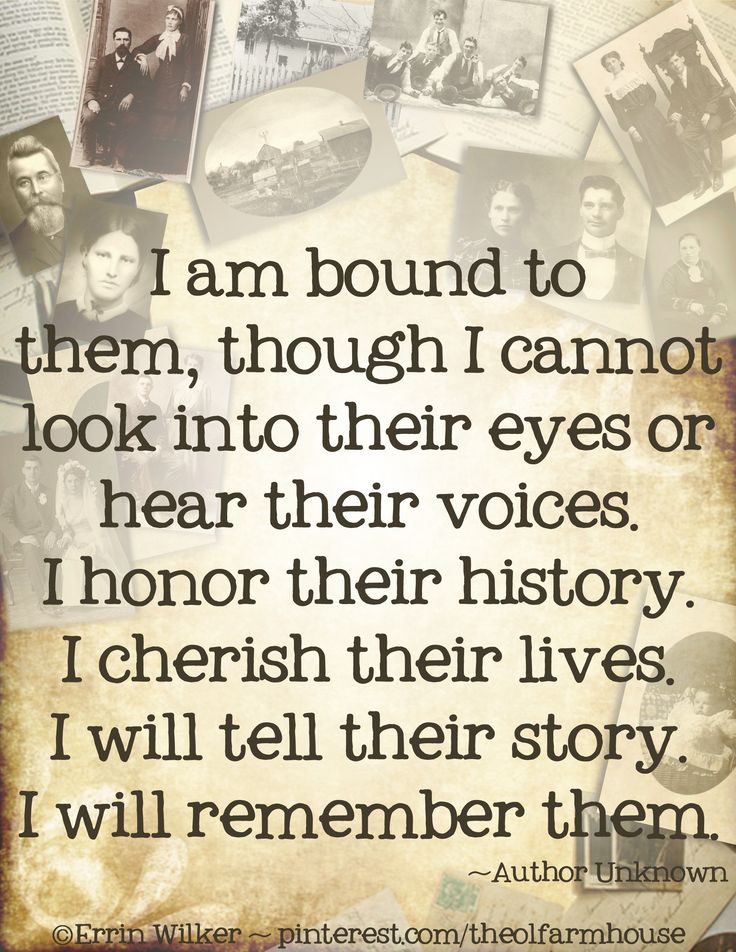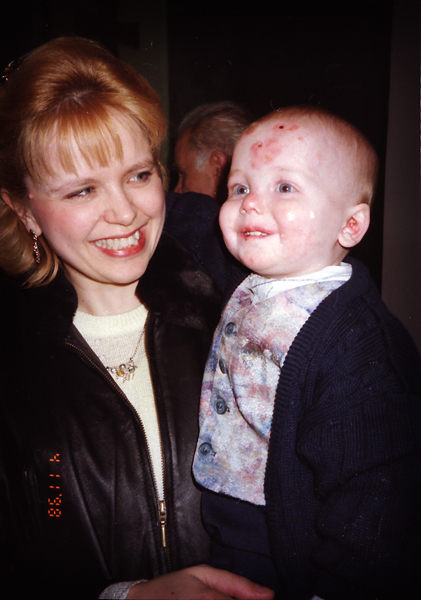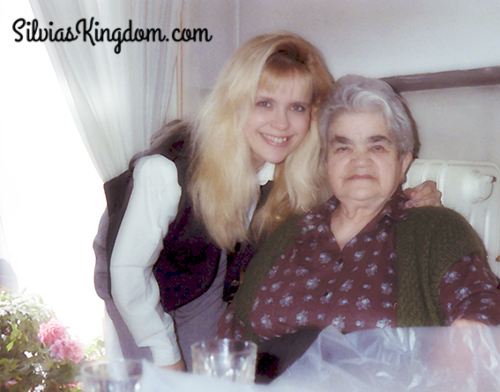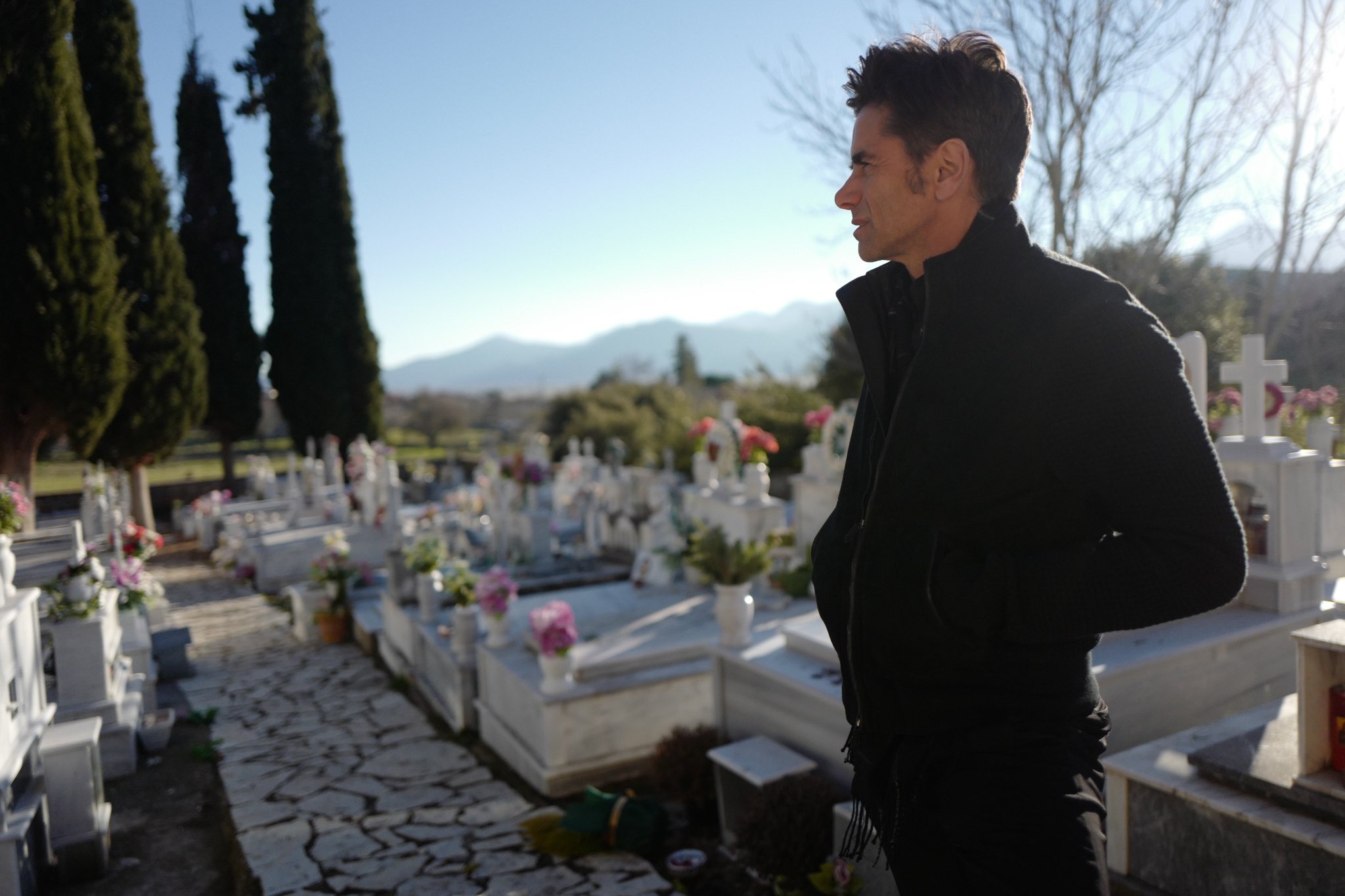If there was one person in my family that I’ve always admired is my aunt (zia) Caterina. Caterina was actually my great-aunt, as she was my grandma’s little sister. Even though we did not live close by, my dad, who absolutely adored her, made sure we took the time to visit her at least once a year.
Why was she so special? Mainly because she suffered a great deal, which made her one of the most compassionate and kind people around. Not only she suffered traumatic injuries when she was a pre-teen, during WW1, she used the little disability money she received to help her family and then the family of her brother-who died young and left a young family behind, and then also the family of her niece, when her husband also died young.
She was also my great-grandparent’s only caregiver in their later years. Zia Caterina never got married, nor had any children, but when she retired in Villa Rosa, near Asiago (Italy), she had more visitors than anyone else. One thing is for certain, her heart will never be matched, and… what an amazing cook she was!
After I moved to the United States and I was on my own, I always sent her a Christmas card every year to make sure she knew I was thinking of her. Occasionally she would send me one back, but it didn’t matter to me if she reciprocated. The last time I saw her, in the summer of 1998, as we walked into her house, which is the house she inherited from her parents, my great-grandparents, I could not help but notice the photos of Nicky on a pin board in the foyer. She gave me a big hug, gave Nicky a big hug and thanked for always remembering her. That meant more to me than words can say.
Just a few months ago I was digitizing some old tapes and the videotape I made that day made me stop and think for a minute. Not only it was amazing to hear her voice again, with her unmistakable Italian/Venetian accent and dialect, but I realized how much I missed her. She died just a few months shy of her 100th birthday in May 2007.
The story of her life was published in a book after the author interviewed her for a compilation of stories of Women in Vicenza in the 1900s. The author interviewed my great-aunt a year before her death when she was 98 years old and the details she expressed in the book are so vivid I haven’t stopped thinking about them since I read them.
I am going to attempt at translating most of her interview here to give everyone a glimpse of her life. The poverty and trauma she endured is something I believe should be shared if only to make everyone appreciate what they have, because they had nothing. Absolutely nothing.
It would be nearly impossible for me to translate verbatim considering the mix of dialect and Italian, so I write in my own words exactly what she is saying. Here goes:
She starts the story talking about her mother Francesca-she weaved baskets and she earned anywhere between 0.03c to 0.10c each depending on size, (note that 1.o Lira was worth about $5 now), they did not have any land to cultivate, but they did have a cow & a goat, they were so hungry that they would eat the crust from the Polenta leftover in the pan. There was not a crumb left at the end of the day.
She then proceeds in talking about her dad Angelo. He was always around getting work where he could. He was mostly a cheese-maker (note: My dad told me he mostly made Asiago cheese) but he also tended to other’s cows, milking them etc.
Caterina had 4 sisters and 1 brother and she names them. They all weaved baskets as it was the only thing they could find to do to earn money. Her brother went to war. Her grandparents had all died by the time she was born except for one that she got to meet once. (note: Her dad Angelo was an orphan and was raised by an aunt, so I am assuming she’s talking about her mother’s father. A very sad story there, Angelo’s parents, which are my great-great-grandparents died in their 30s, his mom supposedly drowned).
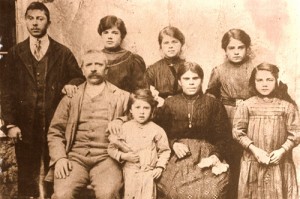
The Busa family, circa 1913 – Caterina is the little girl between her parents, my grandma is the little girl to the right.
She then talks about school. She only finished 4th grade. She loved to read and it was her passion. She speaks about how hard first grade was… that she repeated first grade 3 times! She says she tells the stories to her nieces and nephews and they laugh, but her parents could not read nor write, so they could not help her. She enjoyed going to school, but she hated to study! She was always in trouble with her teachers who would put her in the sand for an hour. She would have gladly gone to school past 4th grade, but the schools were far and there was no transportation, plus the schools were not free past 4th grade and there was no money anyway.
Her oldest sister then started being a seamstress. She had a lot of material lying around so she made her her fist doll. Before then her only dolls were made with stones! She would get a long stone, draw a face and she was happy with that! Now, one would laugh about that, but they were happy!
With stones they would also play hopscotch a lot. In the Winter they would play with the snow and ice-there was a small pond nearby and they would go slide. She then talks about how my grandma (her sister) would enjoy sliding and would even make sleds and skis.
One other thing they would do for fun is sing! A lot of girls would get together and go in a barn and sing and the old folks would tell them stories.
The next subject she speaks about is World War 1. Because the area where she lived was full of grassy fields, it was soon filled with tents full of mostly Italian soldiers, Majors, even Captains, but there were many French and English ones as well. They enjoyed listening to the trumpets they used. The English had military priests and they used to go to their mass in the field even though they did not understand anything. They liked it because during communion they would give them a piece of blessed bread! During this time they did not suffer from hunger because the soldiers used to bring food for them, even the English and French ones! At one point one of the Military people asked her dad to open a Tavern in his house, he had 4 daughters that were old enough to help, and they could cook food for the soldiers, so he did and they did OK with money because a lot of the soldiers used to spend a lot of money on alcohol.
Not too far from them, less than 2 kilometers away, the soldiers had built some tunnels for protection, so when they heard the alarm of the bombardments starting and airplanes flying overhead they would run to the tunnels. Sometimes the bombardments would last all day. Asiago was completely destroyed by the bombing and they had to rebuild it. She states they were lucky as not one house on their street was destroyed. At one point she and my grandma went to live in safety with their cousins in Sarcedo and the rest of the family stayed behind with the Tavern. Her dad Angelo was hard on the soldiers, they could not absolutely touch his daughters, let alone date them! Caterina’s sisters were forbid to date altogether and they watched them like a hawk every minute of every day.
Then there was the incident… the tragedy of the bomb. It happened one day in 1918 when she was 11. She was outside with the animals and nearby there was the cable-way which brought supplies to the British troops from Granezza. From this cable-way something fell off and she picked it up and looked at it. It was a little cardboard tube about as big as a finger. Around the tube there was a little ring which looked like it was made of gold! Every married woman wore a ring so she wanted it. She banged it and banged it to try to get it lose and then finally got a rock and hit it and it exploded in her hand! It was a small bomb, called Capus, if it had been any bigger it would have killed her. Her hand was bloody, and so was her left eye. She ran home as the blood was gushing out like a faucet. Immediately they took her to the hospital in Thiene in a little carriage dragged by a horse. Her parents had a hard time finding the horse but finally someone helped out (note: Thiene is a good 20+ miles away from Lusiana, so one can imagine how many hours she went without medical care and what kind of ride she had down the mountain, the roads back then were not paved of course). She would stay in the hospital for 20 days, since part of her fingers had been obliterated by the bomb and the Doctors had to cut the roots of her injured eye so they could save the other one, then they had to take her to Padova to remove it. They bandaged up her hand good, but even after getting home her hand had quite a bit of crusts and non-healing areas and scars which a British medic that stayed near them helped her with, but it did take quite a long time. At the hospital they put a bandage over her eye after removing it which stayed there for a long time, later they put a glass eye there which was fine, but as she got older it kept falling so the Doctor agreed that it was better if she did not wear it. After 3 or 4 years she started getting disability, which was L7.000 per month which helped her family tremendously. The fortune of her family was that she got hurt because she started receiving disability! It was not a whole lot, but it helped a lot since there were 10 of them in the family! (note: I was trying to calculate this amount and it seems to be too much, I think she meant to say per year, not per month, or she added one more extra zeroes… hmmm. L7.000 in 1923 would be worth about $12,000 today, so I am thinking it was probably just L7, which would be $35 per month. Also, another thing that does not make sense is when she says they were 10 in the family: 6 children + 2 parents is 8 people in the family, not 10, so my dad and my aunt were scratching their head about this one, ha ha).

Caterina in front of her house in her mid 90s, still carrying wood on her shoulders as she did when she was a teenager
After she healed from the accident she started going back to the woods, cutting or collecting wood branches and sell the wood to earn extra money, they would carry the wood on their back or in a carriage so two sisters would help each other. It was against the law to collect branches that were still green but sometimes they could not find dried up wood, so they risked getting a ticket, but thankfully they never did because they always hid it well and evaded the authorities.
After she started getting disability her dad bought two more cows and that helped a lot, they even got some chickens. She laments that they really, really had a rough childhood, how she was a rich lady in comparison now, even has too much food, if she had had 1/4 then of what she has now, it would have been more than enough! At the time they only ate Polenta, without nothing on top. Later they rented a piece of land and planted potatoes which they cooked in every which way, they thought we were rich!
She then speaks about not getting married. After she got hurt, boys would avoid her, and in the end she thought that she would have ruined a man’s life by getting married to them anyway. She also realized that there had been some men interested in her, but only for her pension! At least, that is what transpired from every man that she dated after that. She sighs that it was just not her destiny. She always lived with her parents, they were old and she didn’t want to move (or get married, she expressed) and leave them alone, they needed her help. All her sisters had gotten married, so she was ‘it’ so to speak.
After her parents died and after World War 2 she remained alone. Her mom died at 84 years old, her dad 86. She recalls that her mom went fast, fifteen days, while her dad suffered a lot for a long time and she was his only caregiver. She always lived in the same house, always, her entire life. She only moved when she went to live in the Retirement home in Asiago in her late 90s. She sold the house to her nephew and when it was renovated she did not recognize it! “It’s a palace now! We only had potable water and electricity in the house until recently” (she does not specify a date, I am assuming somewhere around the 60s or 70s, maybe a little earlier but not by much, certainly not when she was younger) When they were growing up they had to get water from a nearby well and they had to clean it too since it was full of bugs. It was harder during the winter, the well would freeze at times. To take a bath they would use puddles deep enough, which were man-made. Everyone in the street would bathe there, sometime two at a time sometimes 3. She states: “We would bathe twice a month. We would sit on these big rocks to get soap and wash off. In the winter we would get a big wooden bath, we would warm up the water, and all 5 of us would bathe in the same water, one after another. We would use the same large wooden bath to wash the clothes. We would warm up the water real hot and put a ton of soap in there and then the clothes. We would leave the clothes in there overnight. That’s how we would wash everything, from clothes to sheets, blankets etc. Sometimes I think, wow, I am a rich lady now, or, man, were we poor! I am very content now. The nurses are nice, I am very happy.”
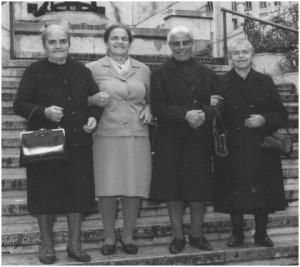
The 4 sisters in 1969! From Left to Right, Giovanna, Rina (my grandmother), Caterina & Angela. Maria died young of cancer in 1941.
There is a page or so in there where she speaks about legends of witches and a red dress, to be honest, I understand none of it, so I will leave it alone, ha ha.
She then starts speaking about Fascism. One of the things she speaks of is a dress with corn that they ‘had’ to wear during marches with a handkerchief. They were forced into these marches or they would execute you! The marches were usually on Sunday, but not always, she did not like them, but thankfully they did not last long. She also was forced into getting a fascist card. To purchase food you had to use that card, and at one point they would only give you a certain amount which wasn’t much.
She says that they were worse off during World War 2 than WW1 because of the food situation. They were only allowed 4-5kg of cornmeal for the Polenta per day and if they caught you with more they would take it away. She says: “We would always try to buy extra from smugglers and it was expensive! We also had to travel farther and farther away to get it, in places such as Sandrigo or Sarcedo and often we would travel during the night. If the fascists would find us they would take it away! Sometimes they would ask for salt in exchange for Polenta, but it was hard because even salt was measured! One time we traveled for 3 days, myself with my sister and nephews to find 10kg of salt. We would sleep in stables or anywhere, we would exchange flour for salt. We also had to give salt to the cows, so we had no choice. Sometimes my sister used to get things from getting people to pity us, she could tell stories!”
Like in WW1, there were bombardments in this war as well. Every now and again they would shoot someone, they executed someone from her street because he joined the partisans. If you joined the partisans you would do well at first, but you always risked your life by doing so. She never sided with anyone, they were all the same! Even the Partisans had gotten some poor military guys in a truck and threw them in the hole near Brenta. (She does not specify here, but there is only one big ‘hole’ in the entire area with a sad history that this could be. It’s called the Voragine at Tarzeloch and I did see it with my own two eyes… scary! It is 80 meters deep… about 263 feet)
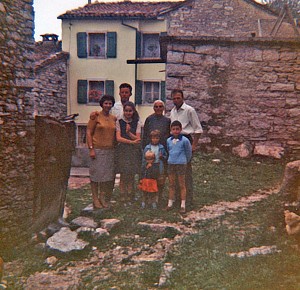
Not a great photo, but I wanted to show the Marziele area where Caterina lived all her life. I am the little blond girl with the red skirt, my dad is the man in the white shirt, hugging zia Caterina. This photo was taken in the summer of 1966
Caterina continues: “Four or five years after the war ended there was an effort to go dig up the bones… they built a platform in wood and everyone went to see. The Partisans and the Germans threw a LOT of people down there, including women who dared to date fascists! These are stories, of course, I don’t know if it’s really true. One true thing is that everyone was extremely mean, we did not know who to side with. I was young, nobody looked at me, but my sisters had to watch out, they could not date partisans! Luckily I did not have a single relative that did. I had a nephew that went to war and was captured by the Nazi and sent to prison in Germany, we thought we would never see him again, so imagine my surprise one evening when his sister came to get me crying how he came home! He was okay and is alive still, but had to walk with a cane ever since.” (note: I was trying to figure out who this nephew was. From the sound of it, his nickname was Toni, and since there is only one nephew that she had which was named Antonio that would fit the age, I am going out on a limb here and say this was Antonio Ronzani, son of her sister Maria. Antonio, born in 1923, would be about the right age as well. I will ask my dad, since this would be his first cousin)
Caterina goes on: “The fascists and the partisans were too, too much. They used to come down the mountain, and since we lived on the outskirts they came right to us, barged inside our house demanding we feed them. We didn’t even have enough food for ourselves! The fascists even convicted women that dated the partisans, as I said before, it was horrible. One sunday after the church services they stopped us into the plaza and asked us not to move and to chant ‘Viva i fascisti’ (Hurray for the Fascists) and then we saw a stage where they had brought out several women we knew and they cut all their hair off as punishment while we were forced to chant and clap, it was horrible.”
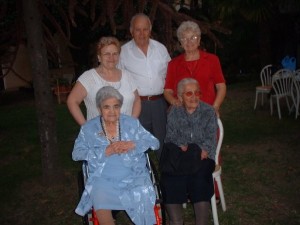
2003 – Zia Caterina, sitting, with my Grandma Rina in blue, and standing is my dad with my aunts. This was the family reunion in occasion of my grandma’s 100th birthday!
“After the war it was better, but it took a while. We had the money, but we could not find the food. My job at this point was still to gather wood and it would be for a while at least until my parents died in 1948 (her mom) and 1950 (her dad). Then in the 1950s I went to Schio to work, we were still gathering wood, always working with wood, I worked with wood my entire life seems like! It was hard to find work, nobody would hire me because of my injuries and one day when I went to complain because they hadn’t raised my disability pension for many, many years, they told me they would find me a job. I was shocked! They took all my information and they said they would send me a letter when they would find me a job. 3 months later I got a letter that they had found me a job in Schio, so I took the Bus and I went to live with the nuns. The first day in Schio I was crossing the street and a police officer stopped me and wanted to give me a ticket because I was not crossing on the stripes! What stripes? I had no idea what he was talking about! The officer laughed, oh, I see you’re a mountaineer! Everyone always laughed when I tell this story.”
“In Schio they paid me by piece, I didn’t earn much, but all I needed was money for food so I gave the rest to the nuns. I did not save much, they only used to pay us once a month. There were about 40 of us from my area, women and men, we also used to make spools for yarns. After 5 years they said I was old enough to retire, so I did. It wasn’t a lot of money, but it was enough. When I moved back I bought an armoire, new sheets for the bed, a couple of new dresses and I hired a truck driver to transport everything back and everyone in the street said I came back a rich lady, ha ha. When I was back home I went back gathering wood, and I did that until just before I came here to this retirement home in 2003, by then I was 96 years old. I still go walk around every day!”
Well, this is the whole story. I hope it was interesting and made everyone appreciate how lucky we are to be living today. Caterina was born 55 years before me, not a big amount of time in the grand scheme of things, and yet her life was so completely different from the one of my generation one can’t help but be amazed how far we’ve come. Wars are not the answer, that much is clear.
I was inspired to write this blog and to make this tribute book for my grandma by the show ‘Who do you think you are’. God Bless!
Click here to view this photo book larger


